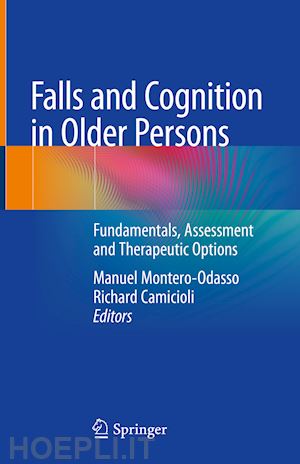
Questo prodotto usufruisce delle SPEDIZIONI GRATIS
selezionando l'opzione Corriere Veloce in fase di ordine.
Pagabile anche con Carta della cultura giovani e del merito, 18App Bonus Cultura e Carta del Docente
The aim of this book is to reduce this gap and to provide practical tools for fall prevention in cognitively impaired populations. The proposed book is designed to present a comprehensive and state-of the-art update that covers the pathophysiology, epidemiology, and clinical presentation of falls in cognitively impaired older adults. We additionally aim to reduce the knowledge gap in the association between cognitive processes and falls for practitioners from a translational perspective: from research evidence to clinical approach. We will address gaps and areas of uncertainty but also we will provide practical evidence-based guidelines for the assessment, approach, and treatment of falls in the cognitively impaired populations.
This book is a unique contribution to the field. Existing textbooks on fall prevention focus in global approaches and only tangentially address the cognitive component of falls and not purposely address special populations and/or settings as residential care and nursing homes. Due to the expected increase of proportion of older adults with cognitive and mobility impairments, this book is also valuable for the whole spectrum of the health care of the elderly. By including a transdisciplinary perspective from geriatric medicine, rehabilitation and physiotherapy medicine, cognitive neurology, and public health, this book will provide a practical and useful resource with wide applicability in falls assessment and prevention.
Part I. Fundaments
1: Falls as a manifestation of brain Failure (Gait and Cognition). MMO, RC, and JV
2: Dysmobility in aging and the role of cognition: Stephanie Studenski,
3: Epidemiology and Falls risk factors in cognitively impaired older adults : S Lord, J Close
4: Depression, Fear of falling, cognition and falls: Ryota Sakurai
5: Consequences of falls in cognitively impaired people:
Part II. Assessments
6: Dual-task gait, cognition and Falls: MMO and OB
7: Gait variability and Falls: J Haussdorf
8: Assistive devices, falls, and cognitive aspects: Susan Muir-Hunter
9: Imaging in “gait and cognition syndrome” and falls. C Rosano
Part III. Special patients and settings
10: PD and Lewy Body Disease: R Camicioli
11: MCI: MMO and SMH
12: AD and other dementias:
13: Approaches in Hospitals and Nursing home settings
Part IV. Prevention and Interventions
14: Current gaps in Guidelines and Recommendations: SMH and Mark Speechley
15: Physical exercises in cognitively vulnerable older adults and falls: TLA16: Cognitive training and falls reduction risk: Karen Li and Louis Bherer
17: Vitamin D, falls and cognition: Cedric Anweiller and MMO
18: Virtual Reality: J Hausdorff and Amat Mireleman
19: Cognitive enhancers: Nico Bohen and MMO
20: Dual-task gait training: Schewnek
21: Non-invasive brain stimulation: Amer Burham and Brad Manor
Part V. Future directions and conclusions
22: Falls in cognitively impaired population: evidence, assumptions, and prospect research neededDr. Manuel Montero-Odasso completed his undergraduate medical degree and his Doctorate in Medicine and Gerontology at the University of Buenos Aires, Argentina. His postgraduate medical training included residencies in Internal Medicine and Geriatric Medicine. He completed a postdoctoral clinical and research fellowship at McGill University, Canada, after which he obtained certification in Internal Medicine and Geriatric Medicine, by the Royal College of Physician and Surgeons, Canada. He is currently a Professor in the Departments of Medicine, and Epidemiology and Biostatistics at the University of Western Ontario, London, Canada. He is the director of the “Gait and Brain Lab” at Parkwood Institute, London, Ontario, where he established a successful Gait and Brain Health research program while remaining an active geriatrician. He focuses on gait performance research combined with neuroimaging as a methodology for the early detection and future prevention of the development of frailty, falls, and dementia in older adults. His clinical trials have applied the novel approach of "improving cognition to improve mobility" using pharmacological and non-pharmacological approaches such as physical exercise, cognitive brain and non-invasive brain stimulation. He is team leader in the Canadian Consortium on Neurodegeneration in Aging (CCNA), Canada's dementia research strategy and Team co-leader in the Ontario Neurodegenerative Research Initiative.
Dr. Richard Camicioli completed his undergraduate education in Engineering Chemistry at Queen’s University in Kingston, Ontario. He trained in Medicinal Chemistry at McGill University where he completed his medical education. After completing a neurology residency at McGill, he obtained postgraduate research training in Geriatric Neurology and in Movement Disorders at Oregon Health and Sciences University and the Portland VA Medical Center in Portland, Oregon. He then assumed a faculty position as Assistant Professor at Oregon Health and Sciences University until 2000 when he moved to the University of Alberta, initially as an Associate Professor in the Department of Medicine (Neurology Division). He is currently a Professor and director of the Cognitive Neurology Program and an attending physician in the Movement Disorder Program. His major research interests relate to bio-fluid, gait and neuro-imaging biomarkers associated with cognition and functional decline in aging and in patients with movement disorders. He directs the Canadian Consortium on Neuro-degeneration of Aging (CCNA) Lewy Body Team.











Il sito utilizza cookie ed altri strumenti di tracciamento che raccolgono informazioni dal dispositivo dell’utente. Oltre ai cookie tecnici ed analitici aggregati, strettamente necessari per il funzionamento di questo sito web, previo consenso dell’utente possono essere installati cookie di profilazione e marketing e cookie dei social media. Cliccando su “Accetto tutti i cookie” saranno attivate tutte le categorie di cookie. Per accettare solo deterninate categorie di cookie, cliccare invece su “Impostazioni cookie”. Chiudendo il banner o continuando a navigare saranno installati solo cookie tecnici. Per maggiori dettagli, consultare la Cookie Policy.